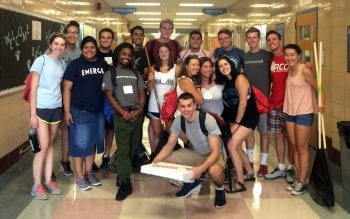Maya Coyle ’19 considers the various communities that have influenced her life and the ways in which her perspective on civic engagement has been shaped by her experiences at the intersection of those communities. Maya has served as a counselor and coordinator for the Gephardt Institute’s Leadership Through Service program. Her involvement with the institute and City Faces prompted her to start Girls Who Code as a response to bridging the gap between her passion for social justice and engineering.
This past spring break, I visited Southern California to see friends and family. I hadn’t been back in years, and I was interested to see what it would feel like to revisit the place I spent nine years of my childhood. The quiet pocket that was West Hills, California, seemed like a black and white photo in my memory. The period of my life from ages four to thirteen was not defined by diverse, vibrant, complicated neighborhoods of Los Angeles. That was simply the backdrop.
Have you ever stopped to think about the communities you are a part of? Count them on your fingers. For me: college student, WashU student, St. Louis resident, engineer, woman, Japanese-American, I could go on. It is interesting to think about the communities we are a part of and those we choose to identify with.
My relationship with the Gephardt Institute began before I was a WashU student, but that relationship has evolved as I have progressed through college. It has been the catalyst that has allowed me to engage with not just the St. Louis community but many of my communities at once. When we are close-minded to the intersections of our communities and identities, we close people off. We close off avenues that house the potential to reach beyond the scope of what a single community can offer.
I joined City Faces my first year to embrace my new identities as a WashU student and St. Louis resident. Before starting college, I vowed that St. Louis would help shape my undergraduate experience rather than just set the scene. Too often, universities that attract people from all over the world are seen as a separate entity from the community they reside in. People come for an education and leave without looking back.
City Faces does mentoring programs with the kids in Clinton-Peabody, a public housing neighborhood in downtown St. Louis. In addition to showing me St. Louis beyond WashU, Clayton, and Forest Park, conversations with kids and fellow volunteers with different perspectives than my own have opened dialogue around the social complexities of the city I now call home. We address topics like hair politics, environmental racism, and colorism. These are words that never cross my lips when I’m in class learning about RLC circuits and second-order differential equations.
So how do you combine these vastly different worlds? When I committed myself to the Electrical Engineering track, I was committing myself to represent a different perspective. As I looked around at my predominantly male, predominantly white, predominantly middle-upper class peers, I understood that lack of representation in engineering stretched far beyond the gender gap. I started Girls Who Code at WashU so that computer science could reach not just more women, but more women of color. Women in St. Louis with different beliefs and backgrounds. Women who can’t necessarily afford a computer to break apart and rebuild so that her parents look at her and think, “My daughter will be an engineer.” It shouldn’t be that hard.
Through the Gephardt Institute, I have realized there are numerous possibilities to integrate my interests and studies into the community I live in. This semester, I am doing an independent research project on incorporating renewable energy in St. Louis’ low-income neighborhoods. I want to see more community-focused projects in the engineering school and at WashU in general. I want my peers to be active members of the communities they are a part of. It feels disappointing to look back on a place you lived for so long and view it as simply a backdrop. Instead, I hope WashU alumni can look back at their time here and feel that St. Louis offered them not just a university, but a community. A home.
